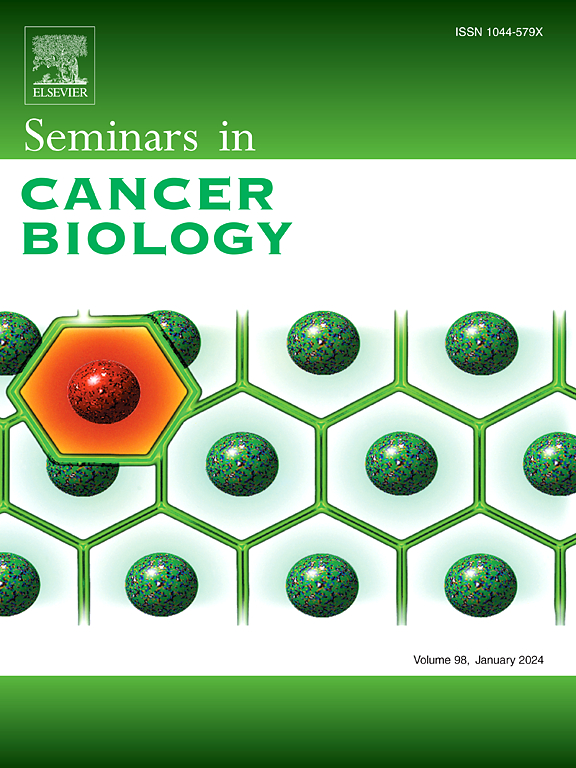Ferroptosis and immunosenescence in colorectal cancer
IF 12.1
1区 医学
Q1 ONCOLOGY
引用次数: 0
Abstract
Colorectal cancer (CRC), ranked as the globe’s third leading malignancy. Despite advancements in therapeutic approaches, the mortality rate remains distressingly high for those afflicted with advanced stages of the disease. Ferroptosis is a programmed form of cell death. The ways of ferroptosis mainly include promoting the accumulation of cellular ROS and increasing the level of cellular Labile iron pool (LIP). Immunosenescence is characterized by a gradual deterioration of the immune system’s ability to respond to pathogens and maintain surveillance against cancer cells. In CRC, this decline is exacerbated by the tumor microenvironment, which can suppress the immune response and promote tumor progression. This paper reviews the relationship between iron prolapse and immune senescence in colorectal cancer, focusing on the following aspects: firstly, the different pathways that induce iron prolapse in colorectal cancer; secondly, immune-immune senescence in colorectal cancer; and lastly, the interactions between immune senescence and iron prolapse in colorectal cancer, e.g., immune-immune senescent cells often exhibit increased oxidative stress, leading to the accumulation of ROS, and consequently to lipid peroxidation and induction of iron-induced cell death. At the same time, ferroptosis induces immune cell senescence as well as alterations in the immune microenvironment by promoting the death of damaged or diseased cells and leading to the inflammation usually associated with it. In conclusion, by exploring the potential targets of ferroptosis and immune senescence in colorectal cancer therapy, we hope to provide a reference for future research.
结直肠癌中的铁蛋白沉积症和免疫衰老
结肠直肠癌(CRC)是全球第三大恶性肿瘤。尽管治疗方法不断进步,但晚期患者的死亡率仍然居高不下,令人痛心。铁变性是一种程序化的细胞死亡形式。铁变性的方式主要包括促进细胞内 ROS 的积累和增加细胞内易变铁池(LIP)的水平。免疫衰老的特点是免疫系统应对病原体和维持对癌细胞监控的能力逐渐衰退。在 CRC 中,肿瘤微环境会抑制免疫反应并促进肿瘤进展,从而加剧这种衰退。本文综述了结直肠癌中铁脱落与免疫衰老之间的关系,重点关注以下几个方面:首先,诱导结直肠癌中铁脱落的不同途径;其次,结直肠癌中的免疫-免疫衰老;最后,结直肠癌中免疫衰老与铁脱落之间的相互作用,例如、免疫-免疫衰老细胞往往表现出氧化应激增加,导致 ROS 积累,进而引起脂质过氧化,诱导铁诱导的细胞死亡。与此同时,铁变态反应会诱导免疫细胞衰老以及免疫微环境的改变,促进受损或患病细胞的死亡,并导致通常与之相关的炎症。总之,我们希望通过探讨铁变态反应和免疫衰老在结直肠癌治疗中的潜在靶点,为今后的研究提供参考。
本文章由计算机程序翻译,如有差异,请以英文原文为准。
求助全文
约1分钟内获得全文
求助全文
来源期刊

Seminars in cancer biology
医学-肿瘤学
CiteScore
26.80
自引率
4.10%
发文量
347
审稿时长
15.1 weeks
期刊介绍:
Seminars in Cancer Biology (YSCBI) is a specialized review journal that focuses on the field of molecular oncology. Its primary objective is to keep scientists up-to-date with the latest developments in this field.
The journal adopts a thematic approach, dedicating each issue to an important topic of interest to cancer biologists. These topics cover a range of research areas, including the underlying genetic and molecular causes of cellular transformation and cancer, as well as the molecular basis of potential therapies.
To ensure the highest quality and expertise, every issue is supervised by a guest editor or editors who are internationally recognized experts in the respective field. Each issue features approximately eight to twelve authoritative invited reviews that cover various aspects of the chosen subject area.
The ultimate goal of each issue of YSCBI is to offer a cohesive, easily comprehensible, and engaging overview of the selected topic. The journal strives to provide scientists with a coordinated and lively examination of the latest developments in the field of molecular oncology.
 求助内容:
求助内容: 应助结果提醒方式:
应助结果提醒方式:


